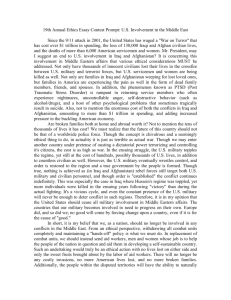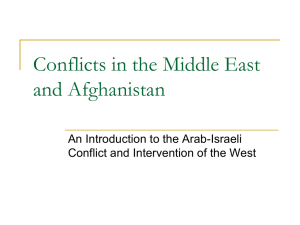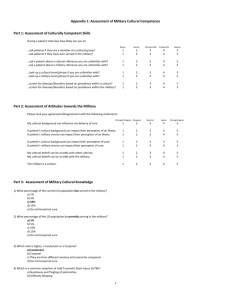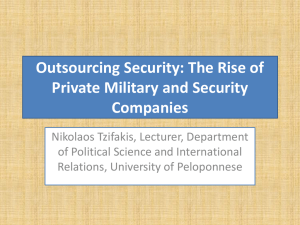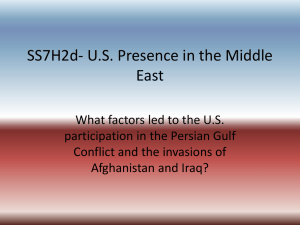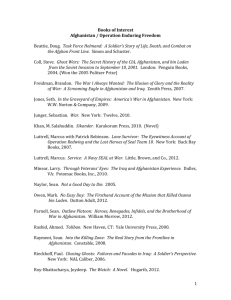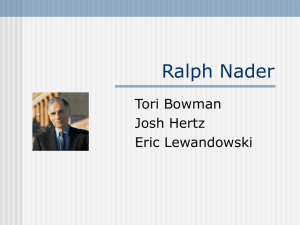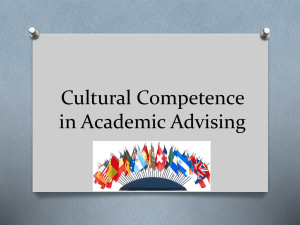Law and Intercultural Competence
advertisement
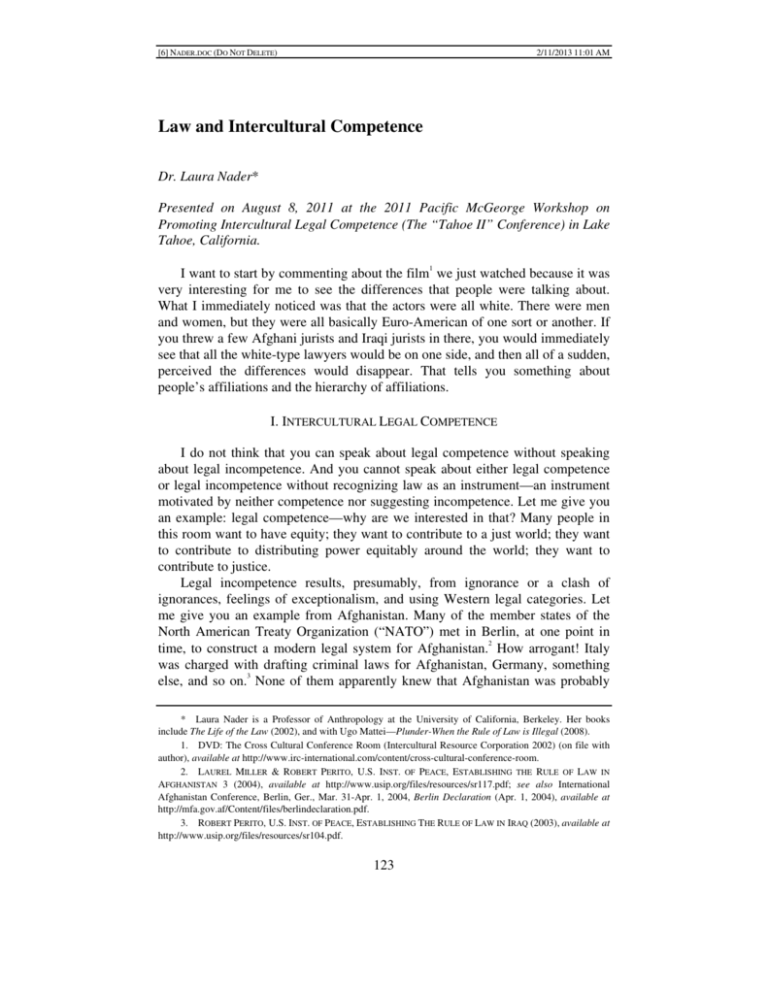
[6] NADER.DOC (DO NOT DELETE) 2/11/2013 11:01 AM Law and Intercultural Competence Dr. Laura Nader* Presented on August 8, 2011 at the 2011 Pacific McGeorge Workshop on Promoting Intercultural Legal Competence (The “Tahoe II” Conference) in Lake Tahoe, California. 1 I want to start by commenting about the film we just watched because it was very interesting for me to see the differences that people were talking about. What I immediately noticed was that the actors were all white. There were men and women, but they were all basically Euro-American of one sort or another. If you threw a few Afghani jurists and Iraqi jurists in there, you would immediately see that all the white-type lawyers would be on one side, and then all of a sudden, perceived the differences would disappear. That tells you something about people’s affiliations and the hierarchy of affiliations. I. INTERCULTURAL LEGAL COMPETENCE I do not think that you can speak about legal competence without speaking about legal incompetence. And you cannot speak about either legal competence or legal incompetence without recognizing law as an instrument—an instrument motivated by neither competence nor suggesting incompetence. Let me give you an example: legal competence—why are we interested in that? Many people in this room want to have equity; they want to contribute to a just world; they want to contribute to distributing power equitably around the world; they want to contribute to justice. Legal incompetence results, presumably, from ignorance or a clash of ignorances, feelings of exceptionalism, and using Western legal categories. Let me give you an example from Afghanistan. Many of the member states of the North American Treaty Organization (“NATO”) met in Berlin, at one point in 2 time, to construct a modern legal system for Afghanistan. How arrogant! Italy was charged with drafting criminal laws for Afghanistan, Germany, something 3 else, and so on. None of them apparently knew that Afghanistan was probably * Laura Nader is a Professor of Anthropology at the University of California, Berkeley. Her books include The Life of the Law (2002), and with Ugo Mattei—Plunder-When the Rule of Law is Illegal (2008). 1. DVD: The Cross Cultural Conference Room (Intercultural Resource Corporation 2002) (on file with author), available at http://www.irc-international.com/content/cross-cultural-conference-room. 2. LAUREL MILLER & ROBERT PERITO, U.S. INST. OF PEACE, ESTABLISHING THE RULE OF LAW IN AFGHANISTAN 3 (2004), available at http://www.usip.org/files/resources/sr117.pdf; see also International Afghanistan Conference, Berlin, Ger., Mar. 31-Apr. 1, 2004, Berlin Declaration (Apr. 1, 2004), available at http://mfa.gov.af/Content/files/berlindeclaration.pdf. 3. ROBERT PERITO, U.S. INST. OF PEACE, ESTABLISHING THE RULE OF LAW IN IRAQ (2003), available at http://www.usip.org/files/resources/sr104.pdf. 123 [6] NADER.DOC (DO NOT DELETE) 2/11/2013 11:01 AM 2013 / Law and Intercultural Competence the most successful decentralized state in the world. In Afghanistan, they had a 4 tradition or a culture that accommodates tribal, customary, Islamic and state law. I challenge anyone to find other countries that can compete with that achievement. And this is not just specific to Afghanistan. For example, Western 5 nations talked about the “rule of law” and about taking the “rule of law” to Iraq. The people who were taking the “rule of law” to Iraq did not seem to understand there was a “rule of law” in Iraq, independent of the dictatorship of Saddam Hussein. II. LAWS AS AN INSTRUMENT OF CHANGE The best example I can think of, regarding law as an instrument of change, is 6 L. Paul Bremer’s edicts revising Iraq’s legal code. One hundred edicts were 7 issued. This reminds me of what must have happened in the sixteenth century when the colonialists from Britain, France, Spain, and Holland went to the new world; how they plundered the new world under the guise of the “rule of law.” Bremer’s edicts in Iraq are an example of the illegal use of the “rule of law,” one that accommodates neoliberal economics and dismantles a welfare state. For whatever you want to say about the hideousness of Saddam Hussein, Iraq had a single payer medical system that most people do not have in the United States. I would suggest for those that are interested in Latin America, if you have not, to 8 read Legal Imperialism by James A. Gardner. It was basically eschewed and was not paid enough attention to. The legal missionaries who went to Brazil, Chile, Argentina, and Columbia, etc. in order to bring them, from the exceptional world, the “rule of law” were practicing intercultural incompetence. Afghanistan is a repeat story. III. LAW AS AN EXERCISE OF POWER Whenever you hear law as an exercise of power, you ought to think about the resource wars. Why are we still in Afghanistan? What does Afghanistan have? Well, we know what Iraq has: oil. Afghanistan has lithium, one of the largest 4. Sean M. Watts & Christopher E. Martin, Nation-Building in Afghanistan: Lessons Identified in Military Justice Reform, 396 ARMY LAW. 1, 4–5 (2006). 5. PERITO, supra note 3. 6. Rajiv Chandraskaran & Walter Pincus, U.S. Edicts Curb Power of Iraq’s Leadership, WASH. POST. (June 27, 2004), http://www.washingtonpost.com/wp-dyn/articles/A8665-2004Jun26.html. 7. Sharon Otterman, IRAQ: The Bremer Edicts, Does the New Marital Law Policy Solidify Iraqi Control of the Country?, THE COUNCIL ON FOREIGN REL. (July 8, 2004), http://www.cfr.org/iraq/iraq-bremer-edicts/ p7639; see also CPA Official Documents, Regulations, THE COALITION PROVISIONAL AUTH., http://www.iraq coalition.org/regulations/index.html#Regulations (last visited Nov. 10, 2012). 8. JAMES A. GARDNER, LEGAL IMPERIALISM: AMERICAN LAWYERS AND FOREIGN AID IN LATIN AMERICA (1981). 124 [6] NADER.DOC (DO NOT DELETE) 2/11/2013 11:01 AM Global Business & Development Law Journal / Vol. 26 9 lithium fields next to Bolivia. All in all, the resource wars factor into how lawyers operate abroad and how they cannot. In a way, you have to know what you are up against when you get into this field, because many people who want to support justice, do good, and have intercultural competence eschew the notion of power. The word “power” does not enter into inequities. What we found out, in the number of years that fourteen students traveled around the world studying different tribal groups, villages, and societies, was that people do not mediate between people of grossly unequal power. You cannot negotiate between people of unequal power. Some of you may have read my article on water rights. You can see that the weaker countries wanted to go to the World Court and the stronger countries wanted to negotiate and mediate, and that should tell us 10 something about the use of negotiation and mediation. In the works that I published with the help of colleagues, Ethnography of 11 12 Law: A Bibliographic Survey, Law in Culture and Society, Harmony 13 14 15 Ideology, Life of the Law, and lastly Plunder, which was stimulated by Bremer’s edicts where the “rule of law” is illegal, I went from the local to the global. Now, I cannot do that anymore because there are no longer any isolated societies. You have to understand that these places are now all part of one picture. Now, what is interesting in Egypt is that in order to get a degree to be a judge in Egypt, one has to know something about Islamic law, about customary law, about Egyptian state law, and international law. Egypt recognizes the importance of these cultural issues, and so we also must recognize the importance of some of these issues. When trying to summarize the work in all of these books, I came across a letter that was written to me by a Catalan philosopher who teaches law in Barcelona, Cesare Arjona Sebastiá. He wanted to write a paper summarizing the ten concepts that he got out of all these books. The first concept points to the user theory of law, which states the law is dependent on who uses it and for what purpose. And, if you have a system where the civil plaintiff cannot access the law, then you will find that the user of the law is going to be the state or a corporation in many cases. The second concept is legal hegemonies—systems of thought about the law that reflect interests of certain powerful groups or classes—the question of 9. Guhlam M. Haniff, Afghanistan’s Lithium, Pakistan’s Loss, NEW AM. MEDIA (July 26, 2010), http://newamericamedia.org/2010/07/afghanistans-lithium-pakistans-loss.php. 10. Laura Nader, Civilization and its Negotiations, in UNDERSTANDING DISPUTES: THE POLITICS OF ARGUMENT 39 (Pat Caplan ed., 1995). 11. LAURA NADER, THE ETHNOGRAPHY OF LAW: A BIBLIOGRAPHICAL SURVEY (1964). 12. LAW IN CULTURE AND SOCIETY (Laura Nader ed., 1997). 13. LAURA NADER, HARMONY IDEOLOGY: JUSTICE AND CONTROL IN A ZAPOTEC MOUNTAIN VILLAGE (1991). 14. LAURA NADER, LIFE OF THE LAW: ANTHROPOLOGICAL PROJECTS (2002). 15. LAURA NADER & UGO MATTEI, PLUNDER: WHEN THE RULE OF LAW IS ILLEGAL (2008). 125 [6] NADER.DOC (DO NOT DELETE) 2/11/2013 11:01 AM 2013 / Law and Intercultural Competence inequities. When the colonialists came to the new world from Europe they developed an idea of law regarding empty lands. There were “empty lands,” but there were Indians living on them. But the Indians were living on little small parcels—they did not know how to use the land. The colonialists believed everybody deserves the land, but the people who deserve it the most are the people who can make use of the land. So they justified the plunder of new world lands. The third concept points to the idea of interdisciplinary study and the blurring of disciplines that can be fruitful, but also dangerous. I think the reason 16 Ugo Mattei and I were able to write the book together is he had no interest in being an anthropologist, and I had no interest in being a lawyer—we just could not have written the book without each other. That is the best kind of interdisciplinary work. You do not get messy that way. The fourth concept is the concrete versus the abstract. In anthropology we 17 focus on the ethnography, which is about the concrete, and Mattei said traditional legal discourse usually deals mainly with abstraction. The fifth concept is legal pluralism—different legal systems coexisting on the same plain. Even in the United States, different legal systems coexist, the local systems in Minnesota or whatever state, and so forth. We do not like to recognize legal pluralism regularly. The sixth concept is the interactive model—giving equal importance to the different parties involved in legal conflict casts light upon power differences. When you are looking at how a decision is made, you do not just look at the person who is responsible, like the judge—you look at the judge, the plaintiff, and the defendant to see what the interaction is and who is more powerful. Of course, today that is even more important because of gross inequalities. The seventh concept is globalization—a new arena where parties are empowered or disempowered. That is clear in the river disputes, a paper that you 18 may have read . The eighth concept is Americanization, which is being experienced in the legal culture worldwide. Alternative Dispute Resolution (“ADR”) has gone worldwide and targeted assassinations, which we seem to be developing in the United States, may also go worldwide. I was quite shocked in the notice about Osama bin Laden’s death that both the President and the Secretary of State 19 equated targeted assassination with justice. Basically, when you get into Americanization and the Americans talking about the “rule of law,” it is a 16. Id. 17. Ethnography is the description of the sociocultural patterns or life-styles of particular societies or groups. See MERRIMAN-WEBSTER, INC., MERRIMAN-WEBSTER’S COLLEGIATE DICTIONARY 398 (10th ed. 1993), available at http://www.merriam-webster.com/dictionary/ethnography. 18. Nader, supra note 10. 19. Laura Nader, Rethinking Salvation Mentality and Counterterrorism, 21 IOWA J. TRANSNAT’L L. & CONTEMP. PROBS. 99 (2012). 126 [6] NADER.DOC (DO NOT DELETE) 2/11/2013 11:01 AM Global Business & Development Law Journal / Vol. 26 problem today because of the hypocrisy, etc. Americans talking about the “rule of law,” are you kidding? From a foreign point of view, it is not believable anymore, especially when you have heads of state calling targeted assassinations justice. This creates problems for American lawyers going abroad and trying to do their best, put their best foot forward because they are being sabotaged by the political realm. And the ninth concept is the justice motive—a reflex-like response to an injustice that is ubiquitous to a human community. Gaza is the best example. Gaza is a jail. The Israelis have gotten away with doing things that no other modern country could possibly get away with and the Americans have backed it, and again that is a difficult problem. Americans talk about the Israeli-Palestinian question as if they were equal powers. Israel is a military power in the world with 20 nuclear weapons. But when we talk about settling the Israeli-Palestinian peace process, we act as if they were equal, and of course it’s a joke to anybody who knows anything about it. You get the flotilla trying to get into Gaza and what 21 happens is the illegal stopping of the flotilla in international waters and nothing happens—it does not go to the World Court. Nobody does anything about it in law. You know, we have a lot of books coming out using the word lawless. 22 Lawless World is the title of one book. And the word “plunder,” after Ugo Mattei and my book came out, it is everywhere now, the whole notion of plunder. You’re up against a real battle, I think. Not because any of you are doing bad things, but because of the contexts in which you are going to have to work or are working. The tenth concept, he said, was political engagement, which constitutes one of the identifying features of anthropological work and can be referred to as the justice mode. Now, in America there have been disagreements. For example, the Woburn case involving polluting of water in Massachusetts, which resulted in the death of 23 young children from leukemia and so forth. Crime is one category, but that case 24 was classified as a civil case. A book was written about the case and was 25 subsequently made into a film titled A Civil Action. Some of these things we see as being rigid. In fact, we can be much more flexible than we think because after 20. Israel ‘has 150 Nuclear Weapons,’ BBC NEWS (May 26, 2008, 9:26 PM), http://news.bbc.co.uk/2/ hi/7420573.stm. 21. See Bloody Israeli Raid on Flotilla Sparks Crisis, NBC NEWS (May 31, 2010, 4:36 PM), http://www. msnbc.msn.com/id/37423584/ns/world_news-mideast_n_africa/t/bloody-israeli-raid-flotilla-sparks-crisis/#.UEaaSo0ia So; Afua Hirsch, Gaza Flotilla Attack: Calls for International Criminal Court to Step in, GUARDIAN (Oct. 8, 2010, 10:45 AM), http://www.guardian.co.uk/world/2010/oct/08/israel-aid-flotilla-raid-calls. 22. PHILIPPE SANDS, LAWLESS WORLD (2006). 23. Anderson v. W.R. Grace & Co., 628 F. Supp. 1219, 1222 (D. Mass. 1986). 24. JOHNATHAN HARR, A CIVIL ACTION (1996). 25. A CIVIL ACTION (Touchstone Pictures 1998). 127 [6] NADER.DOC (DO NOT DELETE) 2/11/2013 11:01 AM 2013 / Law and Intercultural Competence the Woburn case, Attorney Generals started treating similar cases as crimes rather than civil actions. The whole notion of the category is not rigid, it can move and so forth, and I think we should take advantage of things like that. My colleague, Roberto Gonzalez, and I just finished a film on Talea de Castro, a village I studied in Mexican Zapotec country. It is called Losing Knowledge: Fifty Years of Zapotec Change, and it is essentially about the destruction of a village. The movie documents everything from the way they grow corn, to agriculture, to the court system, to the whole village. A village that lasted 500 years after the conquest by the Spaniards has finally been conquered. How has it been conquered? The North American Free Trade Agreement 26 (“NAFTA”). When NAFTA was passed in Washington, D.C., the congressmen who passed the law did not think of the consequences. Often, they cannot even tell you what is in the law. There was a public citizen test done on that. Well, how come the corn comes in from mid-Western United States to the place where corn was invented and it destroys the village? You cannot even stay within the confines of the law. I mean, that’s legislative, right? And if I think about my second field site Libya, in Southern Lebanon, where I studied wasta (the mediation and negotiation practices that were used in Southern Lebanon in 1961 when I was there), and I had a former student and filmmaker, who did my Zapotec film, go back to that village in Southern Lebanon and of course there is no wasta there anymore. They barely let the visitors stay in the village two minutes and let them take one photograph and would not let them take any more. Basically we have these two villages where I studied, destroyed for one reason or another. One was NAFTA and the other was 27 the Israeli invasion of Southern Lebanon. What is the relevance of all this to the practicing lawyer? It is something you have to keep in the back of your mind as you do your work. Some years ago the U.S. Air Force developed a checklist to make sure that they did not get into problems with accidents in airplanes and so on. That idea of a checklist was then 28 picked up by Atul Gawande of Harvard Medical School to be used and he published a checklist that has been used by a large number of hospitals, and you 29 cannot believe the number of lives it has saved. One of the first things they tell you is if you are going to operate, you wash your hands. If you are going to be in the operating room, you wash your hands. That is on the checklist. That is how simple it is. 26. North American Free Trade Agreement, U.S.-Can.-Mex., Dec. 8-17, 1992, 32 I.L.M. 289. 27. Thomas Freidman, Big Israeli Force Invades South Lebanon, N.Y. TIMES (June 7, 1982), http://www.nytimes.com/1982/06/07/world/big-israeli-force-invades-south-lebanon-sharp-fighting-withguerrillas-reported.html. 28. ATUL GAWANDE, THE CHECKLIST MANIFESTO: HOW TO GET THINGS RIGHT (2009). 29. Lea Winerman, Surgical Checklist Saves Lives, Dr. Atul Gawande’s Research Shows, PBS (Feb. 8, 2010, 4:00 PM), http://www.pbs.org/newshour/rundown/2010/02/dr-atul-gawande-surgical-checklist-saves-lives.html. 128 [6] NADER.DOC (DO NOT DELETE) 2/11/2013 11:01 AM Global Business & Development Law Journal / Vol. 26 So maybe what we need to do is develop a checklist for legal competence. What would be on this checklist? Well, maybe this is something to discuss later on. One thing is for certain, Western legal categories do not apply everywhere and law is not autonomous. Keep that in mind. You cannot focus on one aspect of the law because there is a process, usually a continuum. If you are an American, or Chinese, or whatever, you cannot ignore exceptionalism— American exceptionalism. This whole notion is probably known worldwide. But if you have power and you think you are exceptional, and you can feed yourself to the world, and they are going to take it because you are better than everybody else, that gets you into trouble. So, you want to make sure you look in the mirror. S. Ishihara the author of The Japan that Can Say No, even had a chapter on the 30 need for Americans to look in the mirror. More recently Scott Shane has written 31 on The Opiate of Exceptionalism. Denial comes partly from the notion of American exceptionalism. Next, human rights are very important. And again it is an uphill battle if targeted assassination is justice. Then how do you sell human rights to people as an American or as anyone. The whole question of human rights has too much asymmetry in it. It started with Mrs. Roosevelt in World War II, and you all know the history of the 1948 Declaration of Human Rights, but it is asymmetrical. We can point the finger at the Chinese and say, “you have all these people in jail,” but they cannot come and look at our jails in California and see 32 what is going on here, which is really terrible. A recent hunger strike brought 33 some attention to it. Another point I would make is that culture is not homogenous. There are as many cultures as there are people, the linguist Edward Sapir pointed out. When you use the word culture, you have to be very careful. For example there is a difference between corporate culture, our American culture. Cultures are not homogenous—be careful. You cannot say that Muslims do this, and Muslims do that, and think you have got it covered; it is not enough, and that is a dangerous use of the notion of culture. The checklist would be my suggestion for how to avoid mistakes regarding some of these issues that I know we are going to discuss. I’ll just leave it at that. 30. SHINTARO ISHIHARA, THE JAPAN THAT CAN SAY NO 26-32 (1991). 31. Scott Shane, The Opiate of Exceptionalism, N.Y. TIMES (Oct. 19, 2012), http://www.nytimes. com/2012/10/21/sunday-review/candidates-and-the-truth-about-america.html?pagewanted=all&_r=0. 32. Prison Receiver: State Cannot Yet Resume Oversight of Inmate Care, CALIFORNIAHEALTHLINE (Jan. 30, 2012), http://www.californiahealthline.org/articles/2012/1/30/prison-receiver-state-cannot-yet-resume-oversight-ofinmate-care.aspx. 33. Sam Stanton, California State Prison Inmates Stage Second Hunger Strike for Better Treatment, SACRAMENTO BEE (Sep. 30, 2011), http://www.sacbee.com/2011/09/30/3949597/california-state-prison-inmates.html# storylink=misearch. 129
